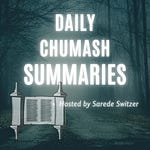Audio Summaries of the daily Chumash portions In loving memory of Ousher Zelig ben Myer HaLevi Z”L
To sponsor an episode please visit: https://itistaught.com/support-this-project/
To get the daily chumash summaries in your email click here https://substack.com/profile/182692001-sarede-rachel-switzer?utm_source=profile-page.
Subscribe on Spotify
Subscribe on Apple Podcasts
Please consider leaving a review on the platform of your choice!
For comments and inquiries, email itistaught@gmail.com
Prophets. False Prophets. Cities of Refuge.
Prophets
Moshe says that the nations from which the Israelites are about to conquer the Land of Israel, practice divination and soothsaying, but to the nation of Israel, G-d did not give these things, but rather His Divine Presence which He made rest in His prophets and the Urim and Tumim.
Moshe instructs them that just as he is a prophet, G-d will set up other prophets to take over from him and then others from those, and all of these prophets must be obeyed.
False Prophets
Moshe explains that these prophets were set up in response to their request not to listen to G-d's voice directly as it was too much for them to handle, which G-d agreed to.
G-d will make sure that His prophets speak in His name if He so desires.
However anyone who prophecies something he didn't hear from G-d, or something which was told to another prophet but not to him, or who speaks in the name of other gods (even if what he says aligns with Jewish Law), the court of man must put him to death by strangulation.
If someone refrains from voicing a true prophecy or transgresses a prophet's words, or a prophet who transgresses his own words, he is killed by the hands of Heaven.
Moshe now instructs them how they will be able to differentiate between a true and false prophet.
He says that if a prophet predicts something which doesn't happen, this means that he is not a true prophet and is not to be feared and he is to be executed.
If a prophet instructs them to break any of the Torah's commandments, he is not to be obeyed unless one is absolutely certain that he is a perfectly righteous person (for example when the prophet Eliyahu sacrificed on a high place on Mount Carmel which was a big exception that was relevant only for that time because sacrificing in those places was technically forbidden yet he did it anyhow to protect Israel from idolatry.
Cities of Refuge
Moshe now instructs them regarding setting up the three cities of refuge within Israel for inadvertent killers. At each of the crossroads leading to these cities, they should inscribe the words "Refuge! Refuge!" These cities should be equidistant from one another and this distance between them should be the same as the distance between one border of Israel and the first city as well as the opposite border of Israel and the third city.
Chumash gives as an example of such an inadvertent killer someone who sets out to chop wood but accidentally, while swinging the ax to cut down the tree, the blade flies off the handle , hitting and killing someone (or alternatively, the ax chipped off a splinter of wood which flew off, hitting and killing someone).
Such an inadvertent killer should flee to one of the cities of refuge in case someone comes after him to avenge the one who was killed's blood.
Moshe now says that if they keep all of His commandments, they will in the future expand their borders and add three additional cities, making for 9 total (3 on the other side of Jordan, 3 within the land of Canaan and then three more in the future (these will be the lands of the Kenites, Kennizites and the Kadmonites).
However if someone kills someone out of hate (i.e. intentionally), and then flees to one of these cities of refuge, the elders of that city are to get him from there and give him over to the one who wishes to avenge the one who died's blood.
*Side note: The text reads that if a man "lies in wait ... and strikes him mortally..". From this Rashi teaches the idea that if someone transgresses a small commandment (i.e to "lie in wait" for someone, they will come to transgress a larger commandment (i.e to kill him).
Moshe says that they should not pity such a person, thinking one person already died, should we really kill another one and make it two dead Israelites? Rather they are to get rid of this innocent shedding of blood which occurred through the killer.






Share this post